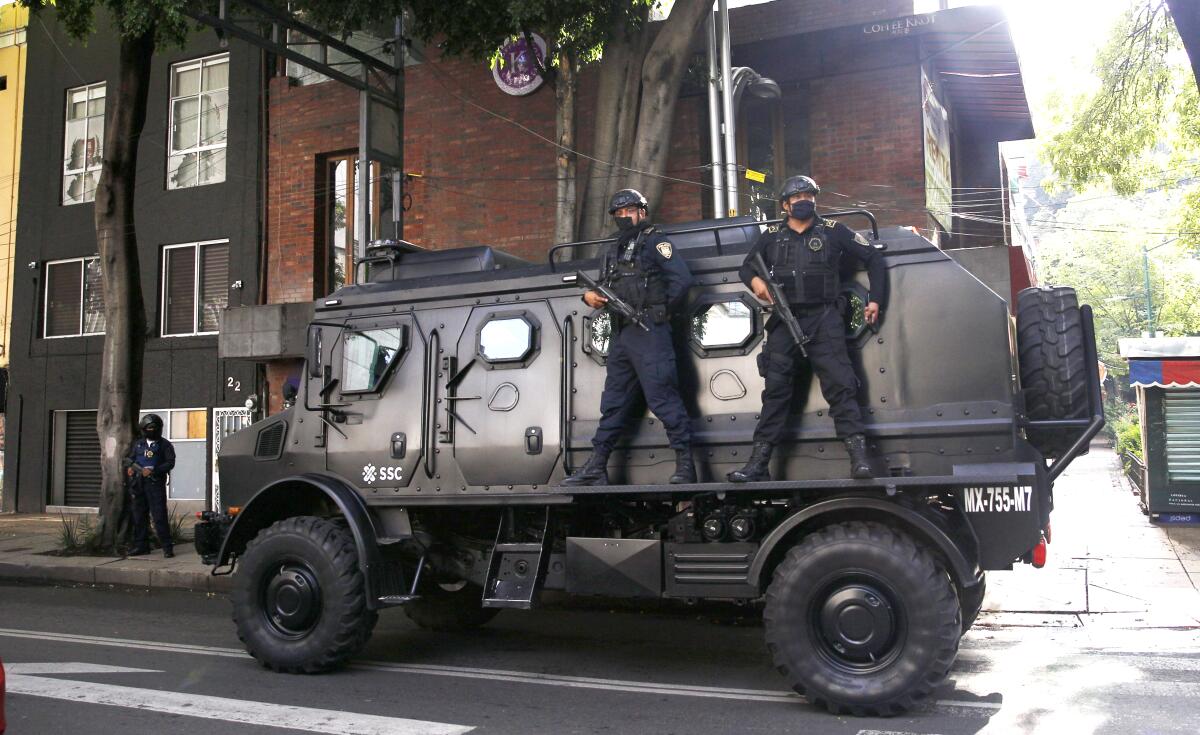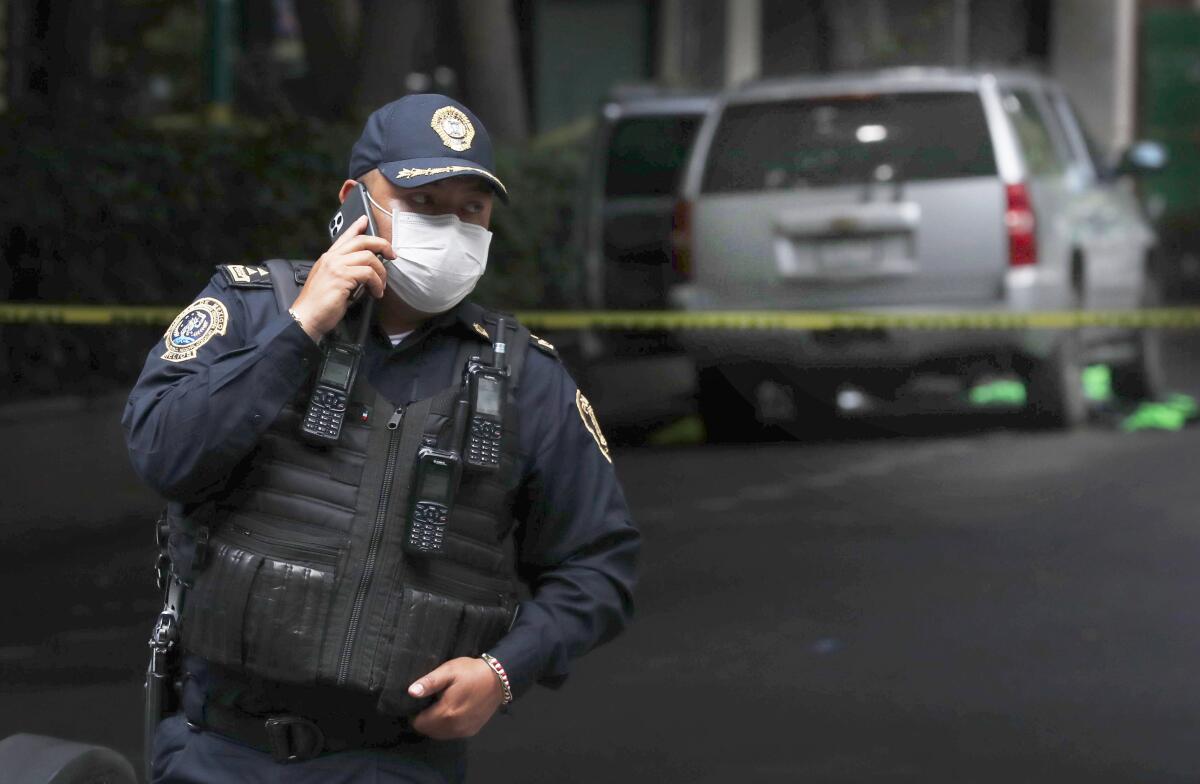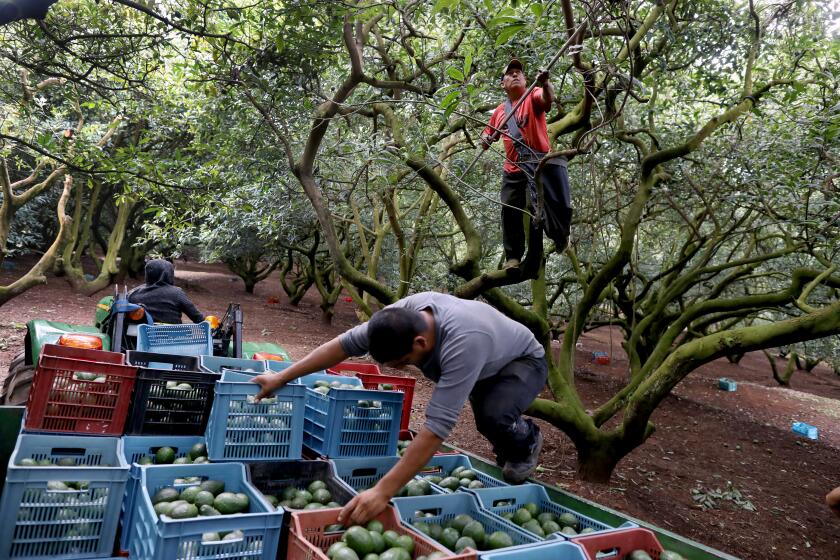Gunmen wound Mexico City police chief in brazen attack that kills three

- Share via
MEXICO CITY — Heavily armed gunmen shot and wounded Mexico City’s police chief Friday in a brazen attack that left three people dead and signaled an alarming advance of organized crime on the nation’s capital, which has been shielded from the country’s worst violence.
Security Secretary Omar García Harfuch, who was being treated in a hospital after being struck by three bullets, tweeted that the Jalisco New Generation cartel, one of Mexico’s most powerful criminal groups, was responsible for the early-morning ambush in one of the nation’s poshest neighborhoods.
García was traveling in an SUV with his security detail at 6:30 a.m. when a large construction truck carrying gunmen armed with high-caliber rifles and grenades blocked its path and opened fire, according to Mexico City Mayor Claudia Sheinbaum, who said 12 people had been arrested in connection with the attack.
Two of those killed worked for García. The third was a 26-year-old woman driving to the quesadilla stall where she worked.
The attack is part of a broader escalation of violence across the country in recent days that has renewed scrutiny of the security strategy embraced by President Andrés Manuel López Obrador.
Hours after the assassination attempt on García, 14 bodies were discovered on the side of a road in the central state of Zacatecas. In the southern state of Oaxaca, 15 people were tortured and killed Sunday in a suspected land dispute.
And in the northern state of Sinaloa, rival factions of the drug cartel once headed by Joaquin “El Chapo” Guzman have been waging near-daily shootouts that have claimed dozens of lives.
The exact motive of the attack on García was unknown, officials said. Mexico City Atty. Gen. Ernestina Godoy Ramos told reporters that those detained said a total of 28 gunmen were recruited about three weeks ago to carry out the execution and were promised cash in exchange for their participation.
Security analysts said the ambush may have been another act of retaliation after recent pressure from the U.S. and Mexican governments on the Jalisco cartel.
Two weeks ago, in the Pacific coast state of Colima, gunmen suspected to be members of the Jalisco gang killed a federal judge who had tried a high-profile case against the son of the cartel’s leader.
García, the 38-year-old son of a telenovela actress and a high-ranking police official, has aggressively gone after the Jalisco cartel and its local allies since taking office in 2019. In April, his forces arrested several alleged members of the cartel.
National Security Secretary Alfonso Durazo said Friday that Mexican intelligence officials reported imminent threats to several high-profile Mexican officials last week, though Durazo did not say who was believed to have made the threats or who they targeted.
It’s not just drugs. Mexico’s cartels are fighting over avocados.
Bold assassination attempts on police and other public figures have long been a dominant feature of the country’s battle against organized crime. Hundreds of police officers have been killed across the country over the last year, including 14 officers massacred in a single ambush in the state of Michoacan in October.
But few such attacks have taken place in Mexico City, the nation’s economic, cultural and political capital, and certainly not on Paseo de la Reforma, its tree-lined principal avenue. The section of the roadway where Friday’s ambush occurred is in the neighborhood of Lomas de Chapultapec, which is home to some of the nation’s wealthiest residents as well as the United States ambassador.

“In 50 years of drug-fueled violence we’ve never seen this,” said security analyst Alejandro Hope. “They have never tried to kill a police chief in Mexico City. It’s really weird and scary.”
Homicides have been steadily rising in the capital in recent years, even as city authorities insisted that the nation’s largest and most brutal criminal organizations, including the Jalisco cartel and its rivals from Sinaloa, did not have a major presence here.
They can no longer make that claim.
In recent months, it’s become clear that the Jalisco cartel had moved beyond simply smuggling drugs through the Mexico City airport and had begun taking a more direct role in local organized crime, said Cassius Wilkinson, a security analyst at the Empra risk consulting firm in Mexico City.
“This week in particular has been really an indictment of the security strategy of López Obrador,” Wilkinson said. “Throughout the country, whether it be political violence or organized-crime-related violence, the Mexican state’s ability to control that violence is very low.”
López Obrador won in a landslide in 2018 on a promise to bring peace to Mexico by creating better living conditions so young people would not end up in organized crime. Those efforts have been hampered by the coronavirus pandemic, which has pushed Mexico’s already struggling economy into a recession.
The pandemic has also drawn law enforcement officials away from their crime-fighting duties, with thousands of members of the president’s newly created National Guard now stationed outside hospitals.
Speaking at his daily news conference, the president suggested the attack on García was actually evidence that his strategy was working, and that security officials were making real inroads in their fight against crime.
The attack, López Obrador said, “without a doubt has to do with the work [García] is carrying out to guarantee peace and tranquility.”
García tweeted about the incident from the hospital where he was being treated.
“This morning we were attacked in a cowardly way by the CJNG,” he said, using the Spanish-language acronym for the Jalisco cartel.
“Two colleagues and friends of mine lost their lives,” he said. “I have three bullet wounds and various pieces of shrapnel. Our nation has to continue standing up to cowardly organized crime. We will continue working.”
Cecilia Sánchez in The Times’ Mexico City bureau contributed to this report.
Several Mexicans who visited Vail have tested positive for coronavirus, raising fears of an outbreak that could devastate the nation’s poor.
More to Read
Sign up for Essential California
The most important California stories and recommendations in your inbox every morning.
You may occasionally receive promotional content from the Los Angeles Times.













